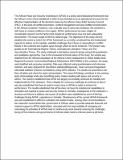| dc.description.abstract | Border security management practices adopted by states vary, depending on the ever evolving international system characterized by increased legal and illegal movement of people and goods. The illegal movement of both people and goods across borders has been of concern. The purpose of this study was to examine the implications of the border security management on Kenya’s national security. Specifically, the study assesses the effectiveness of measures adopted by Kenya’s border security management actors at Moyale land post in enhancing national security, evaluates the existing legal and policy border security management framework in enhancing Kenya’s national security, examines select socio cultural aspects at play and seeks to determine the challenges that border security management actors at Moyale land post may contend with in their efforts to enhance Kenya’s national security. Based on the realism and Regional Security Complex theories, the study adopted a descriptive research design, mixing both quantitative and qualitative approaches to data collection. The study targeted a total of 493 respondents out of which a sample of 220 was obtained using Yamane Formula. The respondents were sampled, using purposive, stratified and simple random sampling methods. Primary data was collected using both questionnaires and Key Informant Interview (KII) guide. Reliability was ensured using the test-retest method while face and content validity were ensured through consultations with supervisors. The collected quantitative data was analysed using descriptive statistics and presented in tables and figures while qualitative data was organized into themes for analysis and reported through narratives and verbatim. The study established that despite the increased revenues and a reduction in insecurity incidents within the territory of Kenya as reported by 64% and 79% of the respondents respectively, incidents of insecurity continued to occur. This points to gaps in the enforcement process, attributable to the absence of a functioning border management committee. The study also established that about a third of the respondents or 27.4% had little knowledge of the specific laws governing border security management, thereby making their enforcement mandate a challenge. The situation is compounded by low levels of education among the respondents as indicated by 34.7 % and 28.9 % who had O-level and certificate levels respectively hence inability to comprehend applicable law. Lack of cooperation from the local community in providing information on illegal immigrants living among the community due to cross border family ties whose social capital superseded their nationality was found to imperil national security. This was illustrated by 34 % of the respondents who strongly agreed. The study recommends that the border security management committee be activated in practice with clear terms of reference and standard operating procedures to ensure that all border security agencies operate within a multi-agency framework in the execution of their mandate. Further, the national and county governments should collaborate in implementing the AUBP’s third pillar of community development in order to incentivize the border community to own the border security management initiative through deliberate effort such as apportioning a fraction of the revenue generated at the OSBP to the local community vide quick impact projects in order to hasten the community’s buy-in of the border security management program. Finally, the study recommends the border management actors to benchmark with well-established OSBPs elsewhere to borrow best practices. | en_US |




